As promised, yesterday the City of Portland installed solar-powered lights to delineate the bike lane on NE Couch as it approaches the Burnside Bridge.
The lights, imported from Denmark by Saris Racks, are part of a test by the Bureau of Transportation (PBOT) to see whether they improve visibility of the bike lane and provide a safety benefit for road users. Because of the “s-curve” at this location, some people tend to veer into the bike lane while driving onto the bridge.
I went out last night to see the lights in action last night…
As you can (hopefully) see in the photos above, these lights are not very bright. Perhaps they’ll get brighter as they soak up more light; but as of right now they’re not exactly super impressive. That being said, they are definitely visible from the perspective of a bike rider. I haven’t seen them from inside my car, so that will be the next test.
Speaking of cars, are drivers respecting the bike lane more with the lights? While I was out there last night, I didn’t see anyone drive into the bike lane.
Another issue we’re currently trying to find out more about is whether or not the installation is complete. Right now, there are relatively large divets around each light. We suspect PBOT will fill in these divets with some sort of material in order to maintain the smoothness of the bike lane stripe.
We’ll keep you posted on any developments with this interesting new addition to the bike lanes.
Have you ridden by these yet? Let us know your thoughts.



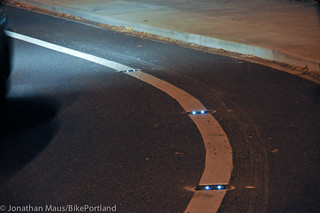
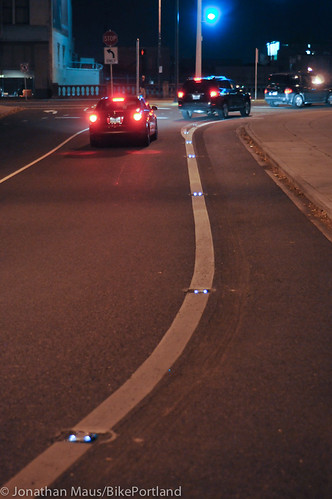
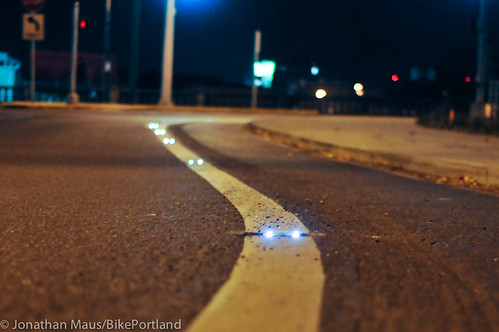
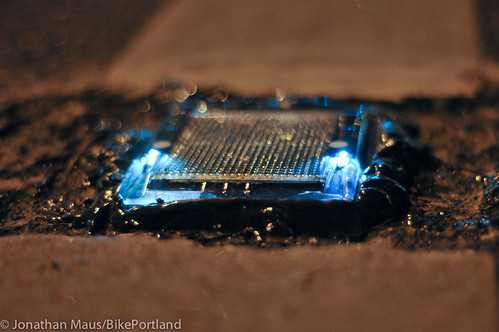
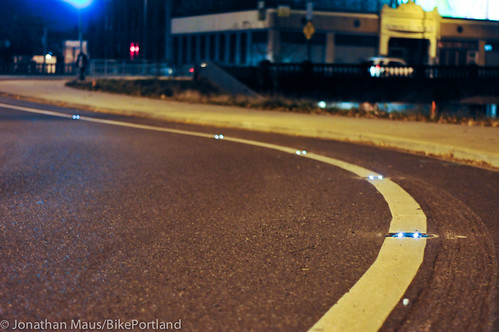
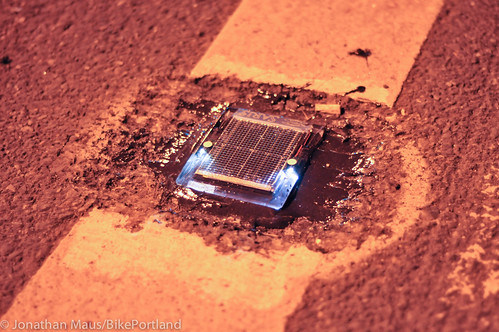
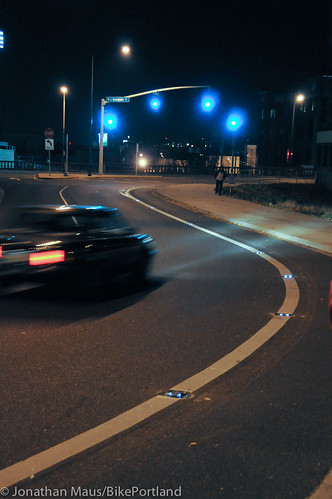
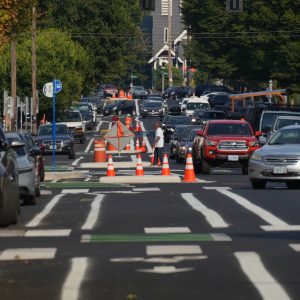
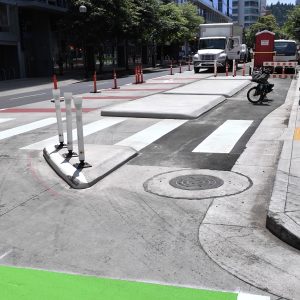
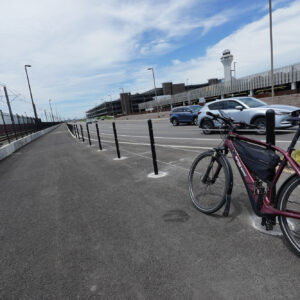
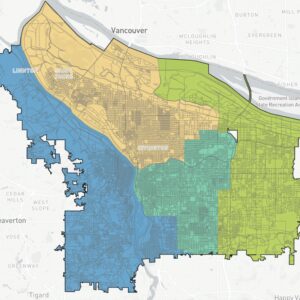
Thanks for reading.
BikePortland has served this community with independent community journalism since 2005. We rely on subscriptions from readers like you to survive. Your financial support is vital in keeping this valuable resource alive and well.
Please subscribe today to strengthen and expand our work.
How are these supposed to be better than the standard reflective bumps, which can reflect alot of light from car headlights?
My thoughts exactly. The reflective thermoplastic is a lot more reliable and cheaper than LEDs. This is a dumb gimmick at one of the least necessary spots for inventive and drastic bike lane delineation.
these are installed on a turn… car headlights only shine where they point, they usually don’t point around turns… drivers should be able to see the bike lanes before their headlights hit them…
While appreciate this effort, none of this would be needed had the bike lane been part of the elevated walkway instead of part of the road. It a patchwork repair to a bad design.
What would be wrong with a wall? This seems kind of silly.
The same issue exists coming down the Lovejoy ramp, I’m always jealous of the wall that the pedestrians have.
I cross there as a pedestrian pretty frequently and wish the wall encompassed the bike lane for visibility, there’s some unnecessary conflict there.
Wait, you wanna put a wall there?
Have you ever ridden that at speed?
So funny.
Nothing should be there but a huge solid stripe or double line.
And even the line is gonna be slick…
hard to pass slower riders around a wall…
At least the city did not have to pay for the lights. I rode by at 6:30am and was not impressed with the brightness of the lights.
The perceived brightness of the lights varies depending on where they are installed. On a dark street with no street lights they will appear much brighter than the current “demo” location which is very well lit from above.
They will likely get less bright over time as their batteries degrade. But, if you can see them at all…
They’re solar-powered.
And what do they use to store the solar power the collect during the day?
Batteries that will almost certainly last 1-2 years, if my experience with lawn-solar lights is any indication…
Batteries in these are rated for 5-6 yrs.
Jonathan, most importantly: what was your assessment of how cars were reacting to the lights? Were they still cutting across that second apex? Cars don’t cut across the first one (because they’re on the inside of it), nor the straight section. It’s the last curve that they’re cutting across – including TriMet busses. That’s the only spot I ever feel squeezed.
Excuse me, “drivers of cars”
It looks like from your first photo that the driver of the SUV is cutting across the island (the hashed area of paint) – so I guess it hasn’t the desired effect.
I didn’t see anyone drive into the bike lane while I was out there.
The problem isn’t (while yes I do see drivers in the bike lane there all the time on the S-curve, especially large trucks, semis and buses) but rather cyclists! I personally find it almost impossible to actually stay in the bike lane once I have reached speed coming from the red light at the bottom (Grand?) climbing up and around to stay in the hairpin to safely turn and stay in that little berth that’s afforded me and often find myself cutting the line into the automobile lane to avoid getting my tire sucked into that terrible grinding job they botched to “fix” their previous painting just so I can continue momentum onto the bridge. It’s just a moment and if there is a car next to me I wouldn’t do anything to endanger myself or a driver so I would then brake and then huff it, shifting awkwardly, but to maintain that steady commute speed; the whole engineering parabolic dynamics are shot at that corner.
I take the lane all the way down Couch and up through the S-curve until the straight section… generally you can go about the same speed as cars and you don’t need to worry about staying inside the bike lane.
whenever I am doing the speed limit and take the lane I tend to get honked at and tailgated by drivers that want to speed…
My guess is that the divots will remain, since they are only a hazard to cyclists and not to motorists. 😉
But seriously, I think they had to grind those divots in order to get the lights flush with the road surface and they can’t fill them in or they would obscure the lights themselves.
Also, although the surface of the lights is textured it still looks like it’s probably slippery if you hit it with skinny tires in the wet.
yes, they can fill them, that’s how they’re designed… the light doesn’t come out the front, it comes out the top at an extreme angle…
They are a solution – but to what problem, I am not sure.
I rode by these on my way in this am (between 6-6:30) and I didn’t find them to be very bright nor did I notice any change in automobile driver behavior (but traffic is very light at that time of the morning.)
Actually – I’m not sure of why there is a focus on this spot – as I’ve never seen a problem. Take those lights to the West end of the bridge and create a proper transition from bike lane to through lane – and then I’ll have something to get excited about. That transition is dicey – even for experienced riders.
I ride across the Burnside Bridge on a nearly daily basis. I’ve never had trouble with a car at that chicane. You’re totally right that these would be better on the other end of the bridge where the right-hook-menace dwells.
This location is for demonstration purposes. If the city moves forward with these, there will be much engineering and thought put into the locations. Just as there is with the green boxes, current bike lanes and streets, etc. It’s a work in progress.
Roundabout 11pm they were looking the same: noticeable, but not exactly attention grabbing. Surely they’re more effective in marginal light than reflectors, though. With the partial closure on Burnside, the end-to-end trip was very nice.
That does bring me back to beating the dead horse… I mean drum… for priorities. This project was peanuts, and it couldn’t be spent on the other end, but c’mon: it’s just a prettier ramp to the W Burnside buzzsaw. It’s even worse on Friday and Saturday nights when you can’t ride through Old Town.
As for walls, please don’t. Timing the lights down Couch builds a lot of momentum to take over the bridge, and you conserve just a little bit more by going slightly wide on that curve.
“Surely they’re more effective in marginal light than reflectors…”
I doubt it, if a motorist has their headlights on, reflectors (particularly white ones) would be much more visible.
To clarify, I’m talking about that very IF. Much less frequent in marginal light.
headlights don’t shine around curves…
About 7:30 today, I noticed them and was kind of impressed with how bright they were. I clearly saw them when I was rolling from Grand to MLK waiting for the light to change. Once the #12 pulled away from the curb, they were visible. Maybe not super bright, but enough for me to see them.
I did notice, however, that several of them were not working. Not sure why that was as I thought they were solar powered.
They turn off as the sun comes up. Not necessarily at the same time though. Same thing when they turn on at night.
Why can’t anyone be stoked on anything?
Because they are very dim compared to even the dimmest LED bicycle lights.
Because they are are a marginal improvement at best.
Because when they wear out quicker than retroreflective paint they will cost much more to replace.
Because at the design spacing and lack of noticeability they will likely have zero effect.
Pretty awesome that they are trying new solutions, though!
At the very least can we prioritize these lights to LOW LIGHT-condition areas? The Barbur Bridges, and the onramp to Beaverton Hillsdale Hwy come immediately to mind. The bridges are in pitch black!
Allegedly there is a brighter version of this from Saris. Chews batteries faster but what’s the payback on deployed effectiveness?
I mean if PBOT purchased some I’d want them to be bright enough to have made a difference.
These are from SARIS. Look closely at one and you can see their logo.
Yes, I noted that these are from Saris.
Was your point that all of the letters in SARIS must be capitalized?
Yay! They put one more bumpy thing on an already sh*tty, dangerously horribly hazardous, swerving into traffic S-Curve!! I can’t wait until my first commute over my generally prefered bridge to downtown so I can hit one with my tire and skid into traffic. Maybe it will even be icy causing even more knuckle crushing, jaw clenching panic.
They are mounted flush to the pavement when installation is complete.
“when installation is complete”
which it isn’t…
I’m a fan of the good ole plastic flexible traffic delineators (aka wiffle bats). Glue them in the inside curve portions, and cars for the most part will try not to hit them as their paint would be scraped. Also provides an audible warning for bikes.
For that particular location though, Jersey barriers are the best imo.
And if you really want to go upscale and euro, Swarovski has retroreflective traffic control glass reflectors:
http://swareflex.com/index.php/ts-home/ts-products/glass-reflectors
fwiw flexible traffic delineators start at under $20 per unit.
they tried that on the Lovejoy viaduct and the idiots managed to rip almost every single one out within the period of a month- whether drivers or cyclist, whatever. Point is, this narrow nightmare of a turn, I can just see the trimet bus collecting a couple every time it makes the turn.
the point was the keep the surface smooth and not create bumps or obstacles in a turn…
A timelapse of the lights in action from last night. It seems that there is too much light from the streetlights and light pollution in general from the city for these lights to be most effective. I can see in a darker part of town or in rural areas where a light path would be useful.
http://vimeo.com/78204977
There looks to be a lot of ambient artificial lighting in the area which reduces the level of conspicuousness of lower powered solar lighting…(INHTO) this type of product would have more effect on trails or darker rural/ suburban facilities . I will go out and see them to see if I reconsider …
Thoughts: 1. From the KGW story last night, it looked like they were installed in the afternoon, so they didn’t have much time to charge. 2. By morning, I bet they’re going to be really dim, so they won’t help morning commuters much if at all. 3. In our short, dark winter days, they’ll build up even less of a charge.
I saw them this morning at 5:30 am and they were bright enough, about as bright as pavement reflectors. Maybe they will get brighter with more charging time.
Which doesn’t answer the question of why not simply use reflectors? To which the answer is: this is a test, a demonstration. If the LED lights work, and depending on how well they work, then the city can think about the optimal places to use them.
My view on this spot is, I would not want the bike lane physically separate from the traffic lane, because most of the time I ride here, I take the lane through the left curve and then join the bike lane halfway through the right curve. You come down Couch at 20-25 mph, the lights are synchronized, a bike goes through the S curve as fast as most cars.
Therefore, if we want to delineate the lane, either these lights, reflectors, or plastic bollards (wands) would all work okay. Just – no curb or other continuous barrier, please.
(If traffic is clogged up and you hit the red light at MLK then using the bike lane all the way through the S makes sense, but then you’re only going 12 mph into the left curve so the LED lights won’t be any kind of slipping hazard unless you are pretty careless.)
first snow plow and those things are history…
What’s a snow plow?
Does Portland/PBOT even own or operate any snow plows?
I remember back during the big ice storm in 03-04 that the official response to the city being shut down was essentially “meh, it’ll melt eventually”.
1 or 2. I remember they plowed a street once, a long time ago…
Portland buys trucks that can be fitted with plows, so 20-30.
snow plows don’t go below the pavement level…
Whoa! Get ready for those cycling stagnation numbers to be blown out of the water!
Maybe they can install these on the Springwater! That would be really cool. Occasionally people forget their lights on the stretch new Sellwood, and you can’t see a thing on moonless nights.
At the start of the curve there is obviously no danger of cars coming over the white line, so the lights just advertise the lane more? I have to say, ever since the buffer was painted where cars have a tendency to cut the corner things have been better. I have not noticed cars cutting in ever since then (hardly at all).
I don’t understand why they didn’t just install something more practical ( and probably cheaper ) like candlestick bollards http://bikeportland.org/2013/10/11/county-adds-plastic-candlestick-bollards-to-hawthorne-viaduct-95457
That’s what i sez (see comment above)
Probably because the lane width design standard used here has to allow the passage of the vehicles that would have passed through the previous roads that were replaced. Hole-in-the-air and all that.
Unfortunately this means 53′ tractor trailers. I haven’t personally drug a long trailer through this S-curve but it looks like a safe driver would need to drive in the bike lane on the inside and outside curves to a keep from driving up on the curbs. Naturally bollards would be wiped out in 1 day. It is very common for road designers to include everything between yellow lines and raised curb edge as the width they are required provide for truck drivers in turns.
A green concrete raised bikeway with a ramped transition would probably be the best that could be done now or with the lack of interest planners had in laying out this S-curve segment.
I went looking through the planning documents and up until the very end of several years of planning on the Burnside-Couch Couplet project this S-curve segment is listed as “Technical refinements to the Burnside and MLK transition will occur upon resolution of PDC’s Burnside Bridgehead Project”. Looking at PDC’s Burnside Bridgehead Project documents only seems to show a lot of design consideration for Green(tm)/LEED building concerns; I couldn’t find any direct mention of this S-curve segment in design documents. This means it was probably designed by the Port of Portland.
From the photos, it appears that the asphalt is milled out, the light epoxied in place, with approximately 1/4″ set above the surface.
Any idea how these are going to hold up to a snow plow?
I believe that the concept is applicable, but the concerns regarding light output and plowing are legit.
Will be researching to see if there is a manufacturer that combines the reflective strip WITH the LED lights.
These would make sense on a straight section of lane, but the viewing angle from a car is not favorable. I think reflectors, by their nature are more effective in this application.
Why not simply install some thin bollards in these type of locations? Auto’s are not going to cross into the cycle path if it means smashing into a bollard first. Plus it would give cyclists a much greater sense of safety with a clear barrier between themselves and the auto traffic.
I’d like to see how these would work if they blinked, like the lights on the ground that I’ve seen in Olympia, both at a ped/bike crossing and along a road centerline.